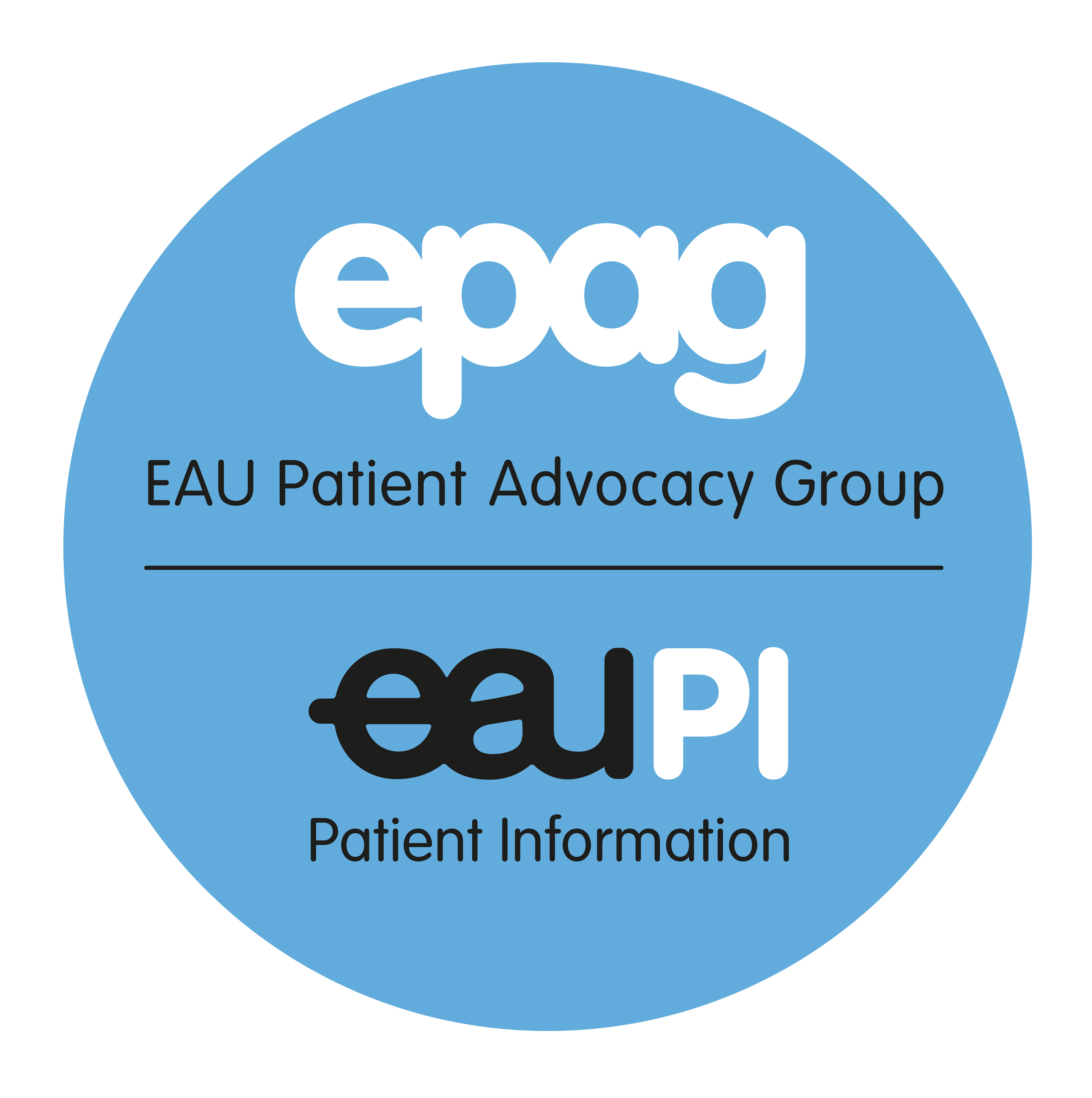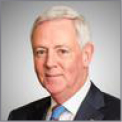Table of Contents
Introduction
Looking beyond the scientific and educational needs of healthcare professionals (HCPs), it is EAU’s aim to play a more important role with regards to strengthening patient advocacy. This is accomplished by taking a variety of proactive steps to work together with patient advocate groups. Foundational elements of the EAU’s aim are recognising and cultivating patient empowerment.
Why patient empowerment?
By empowering patients to take co-responsibility for the management of their condition, it may not only enhance medical outcomes but also lower costs. Patient empowerment means putting the needs of patients first. It is about designing and delivering health services in a way, which is inclusive and enables citizens to take responsibility and control of their healthcare needs. This is effectively done by transferring knowledge, by educating patients (novices and advanced) and by offering them a platform from which to voice their needs and wishes.
Becoming engaged with, empowered during and after their medical journey has become more and more important to patients, survivors, and caregivers. Patient advocates, i.e. persons or organisations, call for an increasing involvement from stakeholders to help educate and involve patients.
Why patient advocacy?
Patient advocacy is an area of specialisation in healthcare concerned with advocacy for patients, survivors, and caregivers. Patients are offered assistance and guidance through a healthcare system so they get the information they need to make informed decisions, which best fits their needs, about their healthcare. In some cases, institutions will offer patient advocacy services.
Patient advocates give a voice to patients, survivors and the patient’s support network. Often times, patient advocates are or have been patients themselves, with an in-depth almost expert knowledge of the disease. This makes them extremely suitable to act as a patient advocate.
Typical advocacy activities can involve the following: monitoring recent developments in treatments and clinical trials or matters relating to patient rights, privacy, confidentiality or informed consent, patient representation, awareness building, support and education of patients, survivors and their carers.
Being an effective patient advocate requires having a skill set which includes, but is not limited to:
- Strong communication: being able to share information in a way that patients can understand
- Promoting patient safety, empowerment and rights
- Working knowledge of medical terminology and the healthcare system
- Understanding how healthcare is financed
- Professionalism in maintaining and ensuring patient confidence
- Being proactive
- Improving systems and policies
- Network skills to build relationships
- Professional development: This focuses on the necessity to enhance job knowledge and professional credibility
On a more patient personal level, here are just some of the reasons why patient advocates are such a vital part of the healthcare world:
- Patient advocates are able to convey to HCPs patients’ needs if they are unable to do so themselves
- Patients should not have to act as their own advocate instead, they should get the support from someone who is knowledgeable and able to act in their best interest
- The patient advocate may be present during appointments to support patients in an active or passive role
- They can help properly prepare patients for appointments by helping them to process information and prepare questions to ask
EAU Activities and Registration fees
The EAU organises a variety of activities and meetings which may be of interest to patient advocate groups. Patient Information encourages groups to participate because these are opportunities to get closer to the sources of information which can directly impact patients.
The EAU offers patient advocates reduced registration fees. To qualify for reduced registration fees, patient advocates/healthcare providers must be professional representatives of patient organisations and have a proof of status (written confirmation from patient advocacy group of membership).
Annual EAU Congress
Full registration is free of charge for patient advocates. A Proof of Status for non-members is required: Written confirmation in English from patient advocacy group of your membership and not older than 3 months.
Patient advocates are eligible to apply for a €500 travel grant.
- A Proof of Status for non-members is required: Written confirmation in English from patient advocacy group of your membership and not older than 3 months.
- A letter is required stating why you want to attend the congress
- You must agree to submit a post-congress report, describing your congress experience and areas for improvement
- Applications are accepted on a first-come-first-serve-basis
To apply send an email to info.patientinformation@uroweb.org
EMUC24
Registration fee: 200 Euro
Registration includes:
- Access to the scientific sessions (Friday, Saturday, Sunday)
- Access to the workshops and extras on Thursday (additional registration fee applies)
- Access to the industry sessions
- Access to the exhibition
- Coffee breaks and lunch breaks
- Access to the content of the EMUC24 Resource Centre
UROonco24
Registration fee: €125
Registration includes:
- Access to the scientific sessions (Thursday, Friday and Saturday)
- Access to the industry sessions
- Access to the exhibition
- Access to the content of the UROonco24 Resource Centre
- Access to the Networking Reception on Thursday evening
- Coffee and lunch breaks
EAU Patient Advocacy Group (EPAG)
To carry out its mission of strengthening urology patient engagement and empowerment, the EAU has established the EAU Patient Advocacy Group (EPAG). The aim is to create an open channel for the EAU to engage with member organisations and for member organisations to be able to voice the collective needs and interests of their patient community. This is done through a platform wherein patient advocates are encouraged to express the patients’ needs regarding education and address areas of awareness, as well as bring into focus and identify specific issues or projects.
The EPAG group is a collective of specifically chosen HCPs from various disciplines and medical backgrounds together with various patient advocate groups.
EPAG is accommodated and facilitated through EAU Patient Information, a section within the EAU involved in urology patient information and education.

EPAG Member Organisations
Healthcare professionals

Caroline Moore
EAU Guidelines Office

Evangelos Liatsikos
EAU Education Office

Sara MacLennan
EAU Guidelines Office
University of Aberdeen

Hein Van Poppel
EAU Policy Office

Eamonn Rogers
EAU Patient Office

Corinne Tillier
EAU Nurses – EAUN

Rodolfo Montironi
Polytechnic University of the
Marche Region, Ancona, Italy
Patient representatives

Wendy Yared
Association of European Cancer Leagues

Antonella Cardone
Cancer Patients Europe

Jacqueline Daly
Caregiver
EGM Cancer Support

Ernst-Günther Carl
Europa Uomo

Erik Briers
Europa Uomo

Anna De Santis
ERN eUROGEN-Interstitial Cystitis

Robert Greene
HungerNdThurst Foundation

Jane Meijlink
International Painful Bladder Foundation

Rob Cornes
ORCHID

Lydia Makaroff
World Bladder Cancer Patient Coalition

Mary Lynne Van Poelgeest
World Federation for Incontinence and Pelvic Problems
EAU Patient Advocate Membership (PAM)
The EAU recently established a membership category for patient advocates. This membership offers a multitude of benefits, including subscriptions to the following:
- Subscription to EUT (digital) – the official journal of the European Association of Urology
- Subscription to Eur Urol (digital) – European Urology publishes peer-reviewed original articles and topical reviews on a wide range of urological topics
- Subscription to European Urology Oncology
- Subscription to European Urology Focus
- Subscription to European Urology Science
- Subscription to the EAU Newsletter sent only to members

